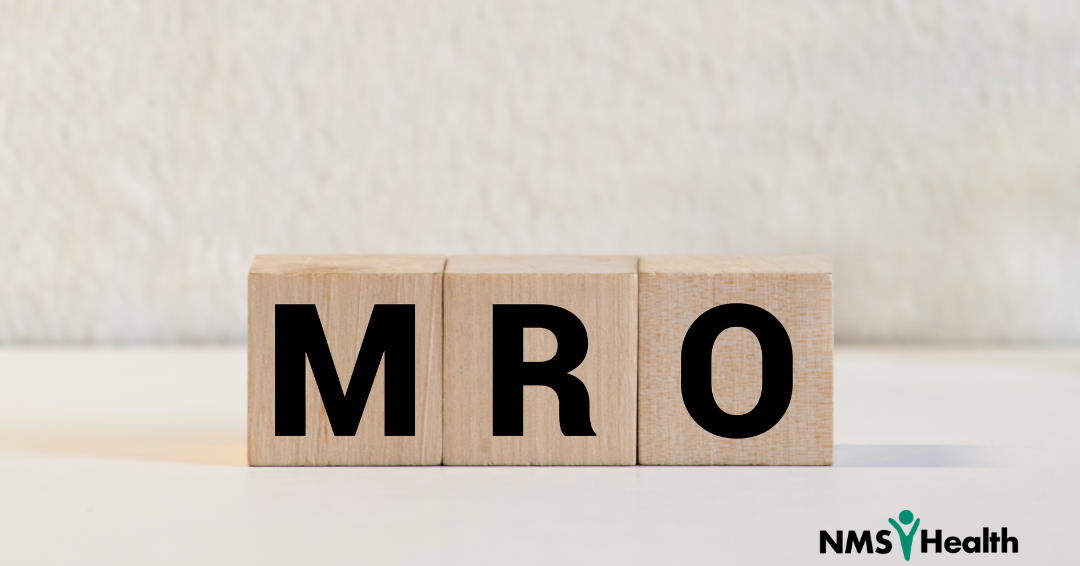A Medical Review Officer (MRO) is a licensed physician who is responsible for reviewing non-negative drug screen results once they are completed at the laboratory. A MRO will review the results and evaluate any medical explanations for those results. MRO’s are responsible for confirming the accuracy and integrity of the drug testing process, determining if the results are legitimate, and ensuring the confidentiality of the health information of the employee being tested.
Employees in safety-sensitive positions regulated by the Department of Transportation (DOT) are required to have drug screens reviewed by an MRO. For non-regulated drug testing, it is the employer’s choice to use an MRO depending on what your specific state laws mandate. Even if it is not mandated by law, using an MRO helps to ensure accuracy of drug screen results and reduces any legal liability for your company.
Non-negative Drug Screen Workflow
Once your employees, receive a collection cup at the laboratory or clinic, they must comply with all facets of the testing. If at this point they interfere with the process or decide to leave the testing site early, this is considered refusal to test.
Aside from not completing testing, refusal to test can be due to:
- Not providing enough urine for testing without documented medical reason
- Leaving the testing site before being permitted or refusing to allow monitoring of the specimen
- Wearing any type of prosthetic device that could alter testing
- Failure to comply with any aspect of the testing
- Confirmation that the specimen was altered or substituted either through admission by the applicant or discovery by the Medical Review Officer.
After collection, if a specimen is tested and the results come back as a non-negative, the laboratory will conduct additional specimen validity testing. If that is also non-negative, results are then forwarded to the Medical Review Officer. Using the contact information on the Chain of Custody, the MRO will reach out to discuss the results and any medication the employee or candidate may be taking.
If the donor is reached, the MRO will explain that they are calling to discuss the test result and if the donor declines to discuss the result, it will be reported as a positive or refusal to test. In addition, if further medical evaluation is needed the donor must comply with the MRO’s request. Failing to due so will also report as a refusal to test.
If the employee or candidate informs the MRO that they do not have a prescription, the MRO will verify the positive result. If they state that they have a prescription, the prescription must be given to the MRO for review within 5 days and include the medication name, dosage, and prescribing physician.
If the donor cannot be reached, the MRO may leave up to three voicemails. The donor must respond within 72 hours. If there is no contact during that time frame, the MRO can only categorize the test as non-negative, as a failure cannot be determined.
Frequently Asked Questions
What are the MRO’s qualifications?
In addition to being a licensed physician, an MRO must have knowledge of substance abuse disorders, pharmacology, and legitimate medical explanations for drug use. In addition, MROs must be certified by either the American Association of Medical Review Officers or the Medical Review Officer Certification Council. MROs must be recertified every 5 years.
Do employees and candidates need to bring medication documents to the testing site?
It is not recommended for employees and candidates to bring their medical documents to the testing site. The laboratory technicians are not responsible for collecting and storing this information, and it will not change the outcome of testing. The MRO will follow up to discuss their medical history if the test comes back non-negative.
Should employers ask their employees and candidates for a copy of their prescriptions?
Employers should not ask their employees and candidates for prescription information. The MRO will collect this information during their interview with the donor and keep that information confidential.
Can I call the MRO directly?
In order to maintain the privacy of the MRO, phone calls cannot be made to them directly. Typically, the NMS Health team will reach out to the donor to arrange a time that is best for them to discuss the results. The MRO will then call the candidate or employee from a blocked number at the predesignated time. Should the call be missed, the candidate or employee should call NMS Health directly, so we can reschedule a time with the MRO.
What if an employee has a medical marijuana card or adult recreational use is regulated in their state?
Regardless of the regulations in the donor’s state of residence, the results are determined in regards to your company’s Substance Abuse Policy. If your Substance Abuse Policy clearly states that marijuana use is not acceptable then the results of the drug screen will reflect that.
When should an employer expect MRO results?
The average turnaround time for a negative drug screen is typically 24-48 hours. However, when there is a non-negative result that needs to be reviewed by an MRO, the process does take more time. It can take several days for the confirmation process at the lab and then additional time for the MRO to connect with the candidate or employee. A typical turnaround time can be up to 7 business days.
Let’s get started!
NMS Health's service is designed to make the screening process simple and less time consuming for your hiring teams. With a large network of clinic and lab partners, we've got coverage in all 50 states!
Click here to Learn More and to get started today!


